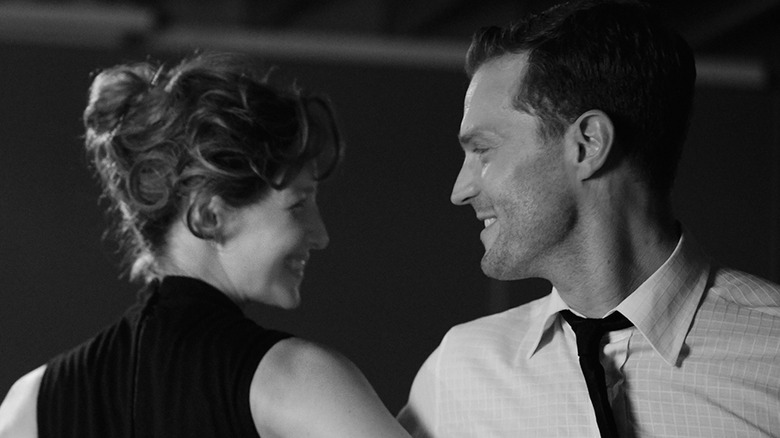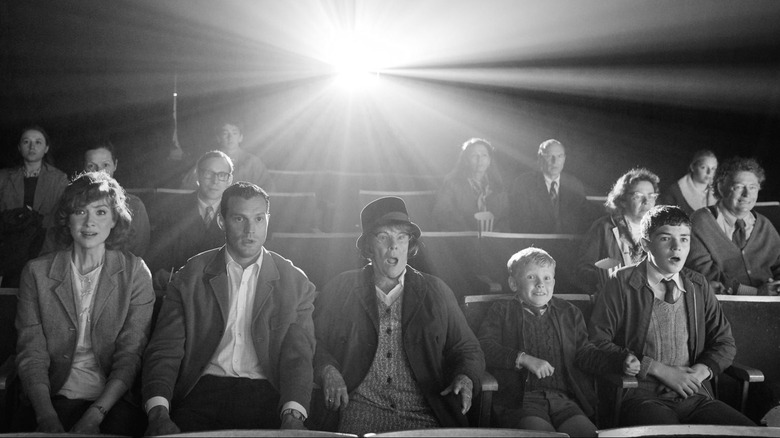Belfast Review: Kenneth Branagh's Drama Is Funny And Sweet And Missing Something [TIFF 2021]
"Belfast" is often a charming and lovely film. The characters are kind and heartfelt, played by talented actors who bring their all to the roles. The black and white cinematography, with touches of color, courtesy of Haris Zambarloukos, is gorgeous and clean. There's a sense of humor to the whole thing that can be quite funny. People clap and dance and laugh and sing, full of life and energy. And yet, something is missing in Kenneth Branagh's semi-autobiographical feature about a young boy living in the midst of the Troubles in Ireland. In trying to create a portrait of an entire neighborhood, Branagh has neglected to give the film a real focus. Yes, there are main characters here, but they often feel slightly removed from everything. Dangerous things happen here, and yet there is a distinct lack of conflict. We never once think anything bad is going to befall these individuals. It all feels so inevitable.
Branagh kicks off his film with a disappointing, TV-style montage of a modern-day Belfast, shot in color. Then, "Wizard of Oz"-style, the director drops us into a black and white 1969. The camera travels through a neighborhood where everybody knows everybody. People stand in doorways sipping tea and chatting and children run about unsupervised, the entire world their playground. It's all so folksy and cute that you might grow a little worried. Then, Branagh wisely, and literally, throws a Molotov cocktail into the scene. The neighborhood is integrated with both Protestants and Catholics, and some Protestants have grown tired of that. A riot ensues, complete with exploding cars, breaking glass, and terrorized locals.
In the middle of all this is young Buddy (Jude Hill), a stand-in for Branagh who lives with his mother (a radiant Caitríona Balfe). Buddy's father, played by Jamie Dornan, is still in the picture, too. But he works in London to pay off the family's considerable debts, and occasionally comes home on weekends. And sometimes weekdays, too – the film is a bit unclear on the character's work schedule and how he can seemingly come and go as he please despite saying several times that he can do no such thing. Essentially, whenever a scene calls for Dornan's character to be involved, Branagh has him materialize as if by magic.
Buddy spends his days enamored with a classmate, running about with friends, and loving movies. Movies are obviously a big part of Branagh's life, so having his film avatar be a movie-lover makes sense. This results in scenes where Buddy watches Westerns on TV, or heads off to the cinema to watch technicolor trifles like "Chitty Chitty Bang Bang." Buddy also spends time with his grandparents, played wonderfully by Judi Dench and Ciarán Hinds. Hinds' performance as the grandfather character is so warm, so lived-in, that it's probably going to make people cry. In truth, I found myself wishing the movie were focused on him instead of Buddy, who really is a bit of blah character, all things considered.
Something's Missing
In his attempt to focus on the characters that inhabit Buddy's world, Branagh loses sight of crafting any sort of conflict. Yes, the Troubles are a serious issue, but they remain mostly in the background, viewed through Buddy's child eyes. Buddy's parents, who are Protestants, are understanding and acceptable and have no issue with Catholics, and while that's nice, it doesn't ring entirely true. The parents are almost too pure. Perhaps because they're modeled on Branagh's real parents, and he's viewing them through loving eyes. Perhaps not.
The only form of conflict Branagh interjects into his story is when Buddy's father decides the family would be better off leaving Belfast. Buddy's mother doesn't even want to hear it, and Balfe captivates us by delivering a tearful speech about how Belfast has been her home her entire life, and the idea of leaving is terrifying and potentially hazardous. But even this isn't quite enough, and the family's eventual move feels entirely inevitable. It's not that a movie must have a conflict as if it were rigidly following a screenwriting handbook. But Branagh's general approach here is a touch too disjointed, too removed. He peppers in anecdotal scenes that are often quite funny, and charming as they may be, they are mostly forgettable.
There's nothing overtly wrong with "Belfast." It's a handsomely-made film with a game cast, and it's clear that it's a very special project for Branagh. But the filmmaker is unable to convey to us, his audience, why it's so special. Perhaps it's a cultural remove; perhaps those who lived through these times will find more to grasp onto here. The rest of us, however, will have to make do with a good-looking movie that fades from our minds the minute we stroll out the door.
/Film Rating: 6.5 out of 10

